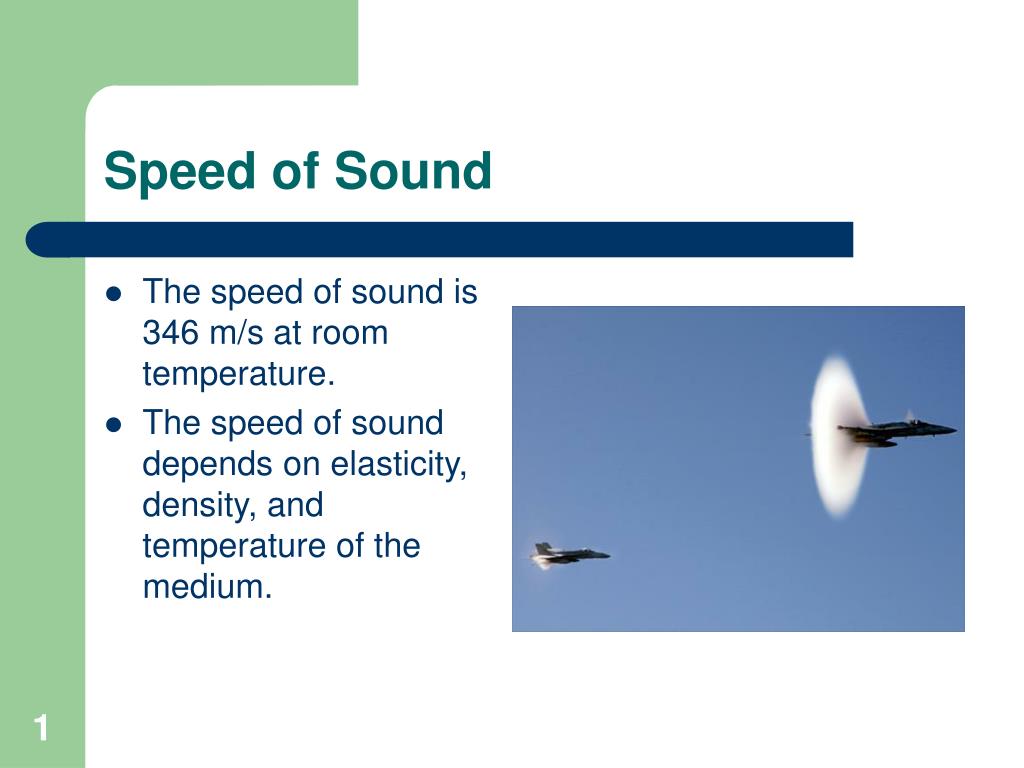

So in air, for example, sound travels at about 340 ms -1 in water, which is a bit stiffer, it's 1430 ms -1 and in steel, which is stiffer still, the waves propagate at over 6000 ms -1. The elastic properties usually have a larger effect that the density so it is important to both material properties.Sound - which is a compression wave - travels at a specific speed in a given medium as a general rule, stiffer materials convey sounds more rapidly than floppier media. This is because the aluminum has a density of 2.7gram per cubic cm which is less than the density of gold, which is about 19 grams per cubic cm. If sound waves were passed through two materials with approximately the same elastic properties such as aluminum (10 psi) and gold (10.8 psi), sound will travel about twice as fast in the aluminum (0.632cm/microsecond) than in the gold (0.324cm/microsecond). Thus, sound will travel at a slower rate in the more dense object if they have the same elastic properties. It takes more energy to make large molecules vibrate than it does to make smaller molecules vibrate. Sound waves are made up of kinetic energy. If a material is more dense because its molecules are larger, it will transmit sound slower. Usually, larger molecules have more mass. A substance that is more dense per volume has more mass per volume. Density describes the mass of a substance per volume. The density of a medium is the second factor that affects the speed of sound. While the density of a medium also affects the speed of sound, the elastic properties have a greater influence on the wave speed. As a result, sound waves travel faster in solids than in liquids, and faster in liquids than in gasses. In general, the bond strength between particles is strongest in solid materials and is weakest in the gaseous state. The phase of matter has a large impact upon the elastic properties of a medium. Therefore, sound can travel faster through mediums with higher elastic properties (like steel) than it can through solids like rubber, which have lower elastic properties. Particles that return to their resting position quickly are ready to move again more quickly, and thus they can vibrate at higher speeds. These forces can be thought of as springs that control how quickly the particles return to their original positions. Steel is a rigid material while rubber deforms easily and is a more flexible material.Īt the particle level, a rigid material is characterized by atoms and/or molecules with strong forces of attraction for each other. A material such as steel will experience a smaller deformation than rubber when a force is applied to the materials. Elastic properties relate to the tendency of a material to maintain its shape and not deform when a force is applied to it. One of the reasons for this is that the elastic properties are different for different materials. The speed of sound is also different for different types of solids, liquids, and gases. Where C ij contains the elastic properties and ρ \rho is the density. The relationship is described by the following equation.

The velocity of a sound wave is affected by two properties of matter: the elastic properties and density. The speed of sound is faster in solid materials and slower in liquids or gases. Similarly, it is harder for sound to pass through gases than through liquids, because gaseous molecules are farther apart. It is easier for sound waves to go through solids than through liquids because the molecules are closer together and more tightly bonded in solids.

The closer the molecules are to each other and the tighter their bonds, the less time it takes for them to pass the sound to each other and the faster sound can travel. Remember that sound is a vibration of kinetic energy passed from molecule to molecule. The speed of sound is not always the same. What happens when there is a change in the material through which the sound travels?


 0 kommentar(er)
0 kommentar(er)
